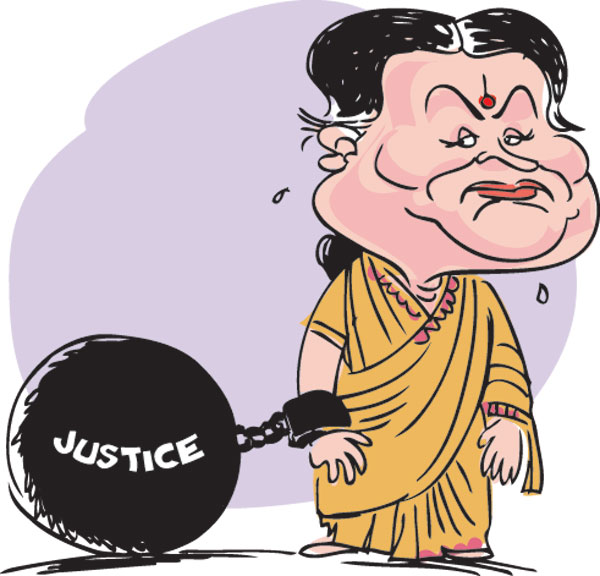Reply To:
Name - Reply Comment
 or political leaders, who seek power, prestige and popularity, personal gain or glory, by plundering the people’s wealth and resources, someday and in a devastating way, a great fall will come. That is a golden principle of life. So it was for Tamil Nadu’s popular and powerful three-term Chief Minister Jayalalithaa Jeyaram who on Saturday was convicted of colossal acts of corruption and stripped of her post as Chief Minister.
or political leaders, who seek power, prestige and popularity, personal gain or glory, by plundering the people’s wealth and resources, someday and in a devastating way, a great fall will come. That is a golden principle of life. So it was for Tamil Nadu’s popular and powerful three-term Chief Minister Jayalalithaa Jeyaram who on Saturday was convicted of colossal acts of corruption and stripped of her post as Chief Minister.
According to the 1,000-page judgment in the case which had dragged on for 18 years, Ms. Jayalalithaa was found guilty of having assets valued at 6.67 billion Sri Lankan rupees. Among other assets disproportionate with her earning capacity were scores of companies set up to launder billions in black money, two estates to the extent of some 2,000 acres, 28 kilos of personal gold, more than 10,000 saris and 750 pairs of shoes. This reminds us of notorious figures like the Philippines’ President Ferdinand Marcos and his wife Imelda who were ousted in the famous people-power revolution led by Cardinal Jaime Sin.
Though the Jayalalithaa trial went on for 18 years and had to be shifted from Chennai to Bangalore for security reasons, it shows the vibrancy of India’s judicial process where all people, whatever their position, are equal before the law. This was a case where justice may have been delayed, but justice was not denied. When it came, the once pretty or petty empress was cast from her throne. All the popularity and prestige of her film-star career as the romantic partner of the former Chief Minister M.G. Ramachandran ended with a thunder bolt of justice and she now lies behind the bars of a VIP jail.
During Ms. Jayalalithaa’s third and last term as Tamil Nadu’s Chief Minister – though some political analysts close to her say she could make a comeback – Sri Lanka’s relationship with Tamil Nadu plunged into the deepest end of the Palk Strait.
Independent political analysts believe the Rajapaksa government also contributed to the breakdown in the relationship by not appointing top professional diplomats to the Deputy High Commission in Chennai. As a result, there are major disputes between the Sri Lankan government and Tamil Nadu in particular if not the whole of India over the ethnic crisis here and the allegations of Tamil Nadu fishermen doing large-scale bottom trawling in the Palk Strait.
What happens in Tamil Nadu next is still uncertain though India’s ruling BJP adviser Subramaniam Swamy says he has advised Prime Minister Narendra Modi to impose direct presidential rule for about two months.

Whatever the political factors, the more important lesson for Sri Lanka is to restore the independence of the judicial service so that it will be able to curb the rampant corruption, the abuse and plunder of public funds and other vices that are going on here unchecked. Instead of a vibrant judicial service as in India where even the Supreme Court is powerfully proactive on social justice issues, what we see in Sri Lanka is a culture of impunity, where the
vulture prevails.
Ruling party politicians, their supporters and stooges, thugs and hooligans are often able or allowed to do what they want because they know they can eventually get away. In Sri Lanka’s crisis of the breakdown of the rule of law, if not lawlessness and anarchy, it is not likely that we will find any of our Jayalalithaas, female or male,
in jail.
But history also shows us that the wheels of justice, though grinding slowly will grind surely and Uva’s political Waterloo was a clear sign that the time is coming when the mighty shall be cast from their thrones of nepotism and cultism. Then they will realise that with nothing they came and with nothing shall they go.